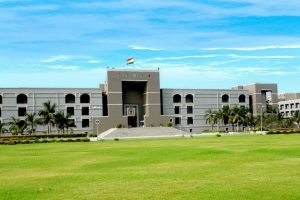Gujarat High Court: A Division Bench of Vikram Nath, CJ and J.B. Padiwala, J., allowed a petition which was filed praying to issue an appropriate writ, order or direction in order to quash and set aside Rule 1 and Rule 2 of the Bar Council of Gujarat (Enrollment) Rules to the extent that they prohibited the admission of a person who was otherwise qualified to be admitted as an advocate, but was either in full or part-time service or employment or was engaged in any trade, business or profession, as an advocate.
It is mandatory for an advocate to be enrolled as such before taking the All India Bar Examination.
As per the Bar Council of India Rules, no advocate enrolled under Section 24 of the Advocates Act, 1961 shall be entitled to practice under Chapter IV of the Advocates Act unless such Advocate successfully passes the All India Bar Examination conducted by the Bar Council of India. The Bar Council of Gujarat has framed the Bar Council of Gujarat (Enrollment Rules) under Section 28(2) (d) read with Section 24(1) (e) of the Advocates Act, 1961 (hereinafter referred to as “the Enrollment Rules”). As is mentioned in Rule 1 of the Enrollment Rules, a person who is otherwise qualified to be admitted as an advocate but is either in full or part-time service or employment or is engaged in any trade, business or profession is not to be admitted as an advocate. Rule 2 of the Enrollment Rules requires every person applying to be admitted as an advocate, to make a declaration in his application that he is not in full or part time service or employment and that he is not engaged in any trade, business or profession contrary to the rules of State Bar Council and of the Bar Council of India made under the Act. The writ applicant duly filled in the application form and also paid fees of Rs 16,600 as required. The writ applicant also duly declared that she is in employment. * The Bar Council of Gujarat, however, did not accept the form of the writ applicant. The writ applicant was told that the application was not accepted as the writ applicant had declared that she was in employment and that a form of only that person who makes a declaration that she is not employed either in full or part time service or employment and is not engaged in any trade, business or profession can be accepted, the writ applicant further submitted that the aforesaid rule was manifestly arbitrary, unreasonable, violative of Articles 14, 19(1)(g) and 21 of the Constitution of India.
The Court keeping in view the interest of all passed the following interim order:
- The writ applicant shall submit an application for enrollment on or before 09-10-2020, the copy of which is at Annexure-D to the writ application.
- The interim order is passed only for the purpose of allowing the writ applicant to appear in the All India Bar Examination and this order shall not be treated as a permission to the writ applicant to continue with both, i.e, her employment and practice.
- Since fees of Rs.16,600/- is already lying deposited with the Bar Council of Gujarat, the payment of further fees shall not be insisted upon. In case the current rules require deposit of fees higher than Rs.16,600/-, the writ applicant undertakes to pay such fees promptly.
- The Bar Council of Gujarat shall accept such application and shall not require the writ applicant to resign from her current employment.
- The Bar Council of Gujarat shall issue Provisional Enrollment Certificate to the writ applicant on or before 15-10-2020, considering that the online registration for the next All India Bar Examination closes on 17-10-2020.
- The respondents shall permit the writ applicant to appear in the All India Bar Examination, as may be held.
- The writ applicant undertakes that she will not practice as an advocate on the basis of the Provisional Enrollment Certificate issued to her.
- The writ applicant shall further undertake that if after the issuance of enrollment certificate and after passing of the All India Bar Exam, if she continues to be in full or part time service or employment or is engaged in any trade, business or profession, she shall deposit her enrollment certificate with the Bar Council and shall not practice as an Advocate.
- The writ applicant shall file undertaking in terms of this order on or before 09-10-2020.
[Twinkle Rahul Mangaonkar v. Union of India, R/Special Civil Application No. 15123 of 2019, decided on 06-10-2020]
*Suchita Shukla, Editorial Assistant ahs put this story together

